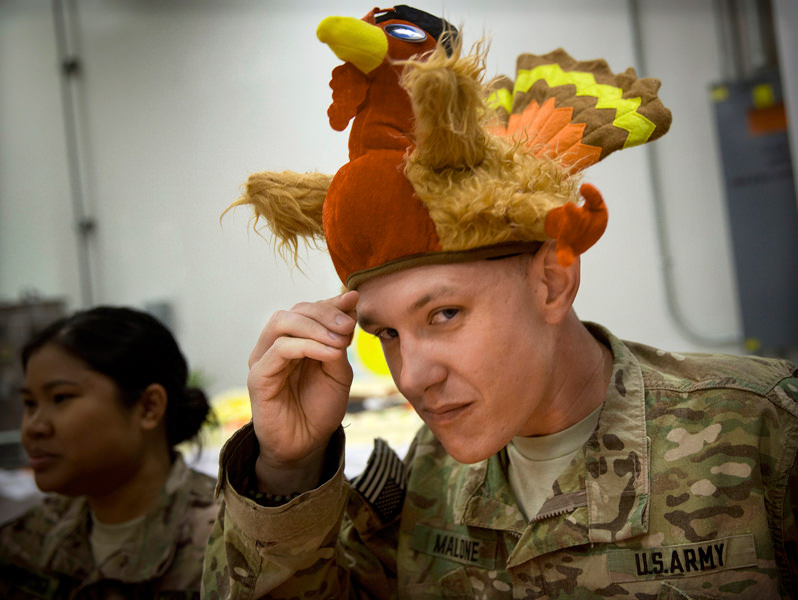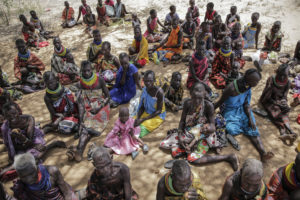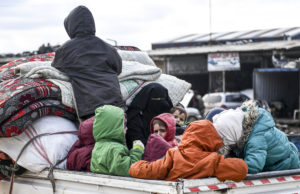Gratitude in a Warring World
As my children’s seventh Thanksgiving rolls around, I want to teach my boys that the holiday is about more than football and stomachaches. A U.S. soldier wears a turkey-shaped hat as he attends a Thanksgiving dinner at his base in Kabul, Afghanistan, in 2013. AP/Anja Niedringhaus
A U.S. soldier wears a turkey-shaped hat as he attends a Thanksgiving dinner at his base in Kabul, Afghanistan, in 2013. AP/Anja Niedringhaus
Even in San Francisco, where Columbus Day has been renamed Indigenous Peoples’ Day, progressive parents are faced with the awkwardness of how to celebrate the highly fictionalized holiday of Thanksgiving. Do we mourn the slaughter of the Native Americans and the rise of colonial European capitalism? Or do we honor the dysfunctional reuniting of our relatives, turning to alcohol and gluttony in order to obliterate the obvious truths we’d rather not see? Another option is to shop till we drop, giving up all pretense of imbuing Thanksgiving with any real values. Finally, there’s football: Macho men (and the women who appreciate such gladiator sports) retreat to their sofas, drinking, burping and watching other men demonstrate Darwin’s Survival of the Fittest.
How did this “all American” holiday morph into a celebration of greed, sloth and gluttony? Don’t get me wrong — I am no Puritan and I do partake in all of these sinful behaviors (and a few more) with zest when given the opportunity. But, if the pilgrims had not come to America, this land might have had less suffering and more gratitude for things that don’t come wrapped in fancy boxes, made by tiny foreign hands.
I was raised to believe in the Charlie Brown version of Thanksgiving. Like many in my generation, I thought that Squanto and the Indians shared their corn willingly with the starving pilgrims in 1621 and taught them how to grow a bountiful harvest. Most schools continue to perpetuate this myth, glossing over the slaughter, rape, pillage and poxes that wiped out hundreds of thousands of native peoples.
It’s a downer to look at the fact that the starving pilgrims actually dug up the Wampanoag tribe’s vast stores of corn and robbed the jewels from the buried bodies of their dead women and children. Who wants to teach their kids that the only reason Squanto knew English was because he was kidnapped by pilgrims?
Sure there were a few moments of peace, gratitude and harmony between the natives and the pilgrims. Perhaps the idea of Thanksgiving camaraderie was more exaggeration and hopeful thinking than outright mendacity. Deeper historical probing reveals that when 90 of the Wampanoag men came to investigate why 50 pilgrims were making such a racket, they discovered a dinner party in progress and chose to bring back some dead deer and wild birds instead of waging war.
Abe Lincoln is to blame for exaggerating this tale of harmony in order to foster peace between North and South during the Civil War. Yet, to forget our crimes against the Native Americans is plainly wrong. As Jews say of the Holocaust, “We Shall Not Forget,” for if you forget history, tragedies will be repeated. Anyone who reads the headlines can see humanity re-enacting our past crimes in every corner of the world from Russia to the Middle East to our very own forgotten ghettos.
Yet as a mother, I don’t know how to balance all this misery with the hope that I may be able to raise peaceful, kind boys who might make the world a better place. Is there a correct moment for a child to learn that the world is not safe; one’s parents are not omnipotent; one’s ancestors committed sins; one’s president is fallible; one’s country is flawed; and there is terror, war, rape and genocide happening in faraway countries and right here on our own doorstep?
Some days, reading the news keeps me from feeling like I am just another playground mom ensconced in PTA meetings, laundry and after-school-chauffeur duties — the kinds of trivialities that make housewives and over-educated mothers go mad.
But then, there’s my news saturation point. I turn off the radio or the computer when the body counts begin — when the details roll in about the grandmother, the child or the schoolhouse that got bombed. Not only don’t I want my children to hear these things, but I cannot bear the grief, the outrage, the guilt. How could the politicians I have voted for (and my countrymen and women) willingly perpetrate atrocities on other people’s grandmothers, grandfathers, sisters, brothers, daughters and sons?
Most days I am more worried about whether my sons will sleep, stop vomiting, stop whining, do their homework, if I’ll have enough money for them to go to college, or whether I’ll be using a cane by then.
Still, as my children’s seventh Thanksgiving rolls around, I want to teach my boys that the holiday is about more than football and stomachaches. Each night my family takes turns saying what we are grateful for. It’s a ritual born of an article I read about the benefits of expressing gratitude: increased immunity, lower blood pressure, less anxiety and depression, and increased happiness.
Aidan and Quinn have been known to express gratitude for Fig Newmans and “Harry Potter,” Legos and rock climbing, sugar and farts. I’ve expressed gratitude for the firemen who rescued my 4-year-old boy from asphyxiating, the traffic cop who gave me a lecture on karma instead of a ticket, the neighbors who walked me through construction terminology when it turned out my house was falling apart, and the man who taught me that some men who appreciate football can also carry on a conversation about organic farming or that love can slap you upside the head when you’re 40-something, turning this cynical New Yorker back into a dreamer.
The other night I dragged my cranky 7-year-olds into the Equator cafe so I could get a dose of caffeine to get me through the rest of the night. The young woman behind the counter with two big black saucer earrings told us that she was hand weaving 50 blankets for homeless people in honor of Thanksgiving. Her friend crushed organic raspberries into sparkling water and offered this magical concoction (for free) to my now mesmerized sons. “You see what miracles can happen when you let your mother get a cup of tea?” I said.
As we giggled our way across the street, the boys allowed me to wrap their small hands into mine — something they do only when they’re especially happy and not worried about being seen. Our small world tilted on its axis. These young women’s actions so beautifully encompassed everything I want to teach my sons about Thanksgiving — that when we express our gratitude (or in this case give others reason to be grateful) — it can create a small but significant shift in the world.
Your support matters…Independent journalism is under threat and overshadowed by heavily funded mainstream media.
You can help level the playing field. Become a member.
Your tax-deductible contribution keeps us digging beneath the headlines to give you thought-provoking, investigative reporting and analysis that unearths what's really happening- without compromise.
Give today to support our courageous, independent journalists.









You need to be a supporter to comment.
There are currently no responses to this article.
Be the first to respond.